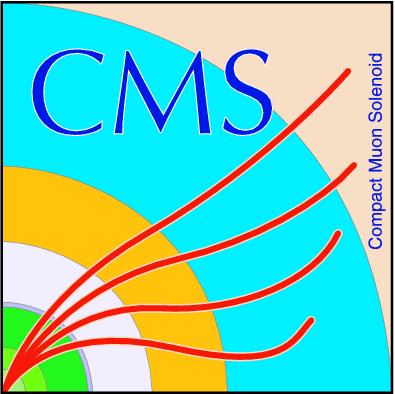
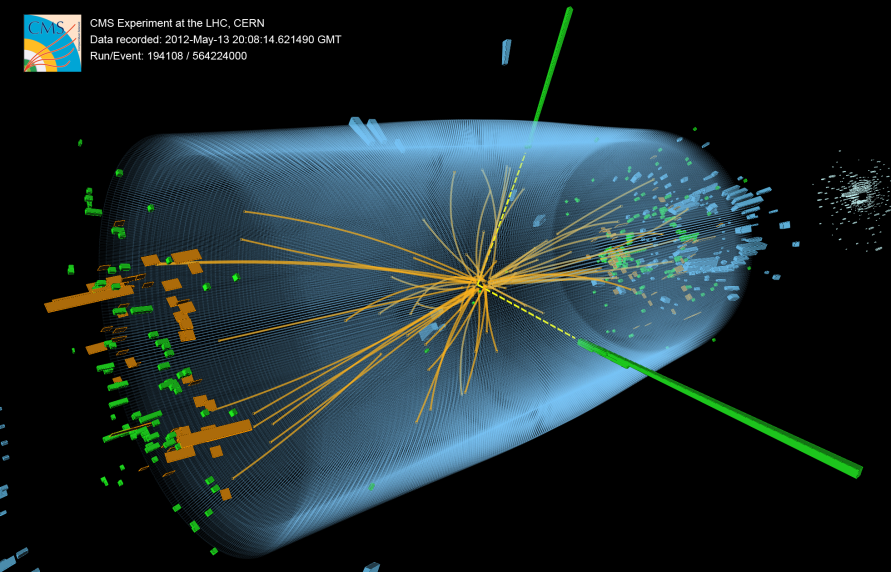
Compact Muon Solenoid
LHC, CERN
| CMS-SMP-20-006 ; CERN-EP-2020-168 | ||
| Measurements of production cross sections of polarized same-sign W boson pairs in association with two jets in proton-proton collisions at $\sqrt{s} = $ 13 TeV | ||
| CMS Collaboration | ||
| 20 September 2020 | ||
| Phys. Lett. B 812 (2020) 136018 | ||
| Abstract: The first measurements of production cross sections of polarized same-sign ${\mathrm{W}^\pm\mathrm{W}^\pm} $ boson pairs in proton-proton collisions are reported. The measurements are based on a data sample collected with the CMS detector at the LHC at a center-of-mass energy of 13 TeV, corresponding to an integrated luminosity of 137 fb$^{-1}$. Events are selected by requiring exactly two same-sign leptons, electrons or muons, moderate missing transverse momentum, and two jets with a large rapidity separation and a large dijet mass to enhance the contribution of same-sign $ {\mathrm{W}^\pm\mathrm{W}^\pm} $ scattering events. An observed (expected) 95% confidence level upper limit of 1.17 (0.88) fb is set on the production cross section for longitudinally polarized same-sign ${\mathrm{W}^\pm\mathrm{W}^\pm} $ boson pairs. The electroweak production of same-sign ${\mathrm{W}^\pm\mathrm{W}^\pm} $ boson pairs with at least one of the W bosons longitudinally polarized is measured with an observed (expected) significance of 2.3 (3.1) standard deviations. | ||
| Links: e-print arXiv:2009.09429 [hep-ex] (PDF) ; CDS record ; inSPIRE record ; HepData record ; CADI line (restricted) ; | ||
| Figures & Tables | Summary | Additional Figures & Tables | References | CMS Publications |
|---|
| Figures | |

png pdf |
Figure 1:
Illustrative Feynman diagrams of VBS processes, where W bosons are radiated from incoming quarks (q), contributing to the EW-induced production of events containing two forward jets and $ {\mathrm{W} ^\pm \mathrm{W} ^\pm} $ boson pairs decaying to leptons. Diagrams with the triple gauge coupling vertex (left), the quartic gauge coupling vertex (center), and the $t$-channel Higgs boson exchange (right) are shown. |
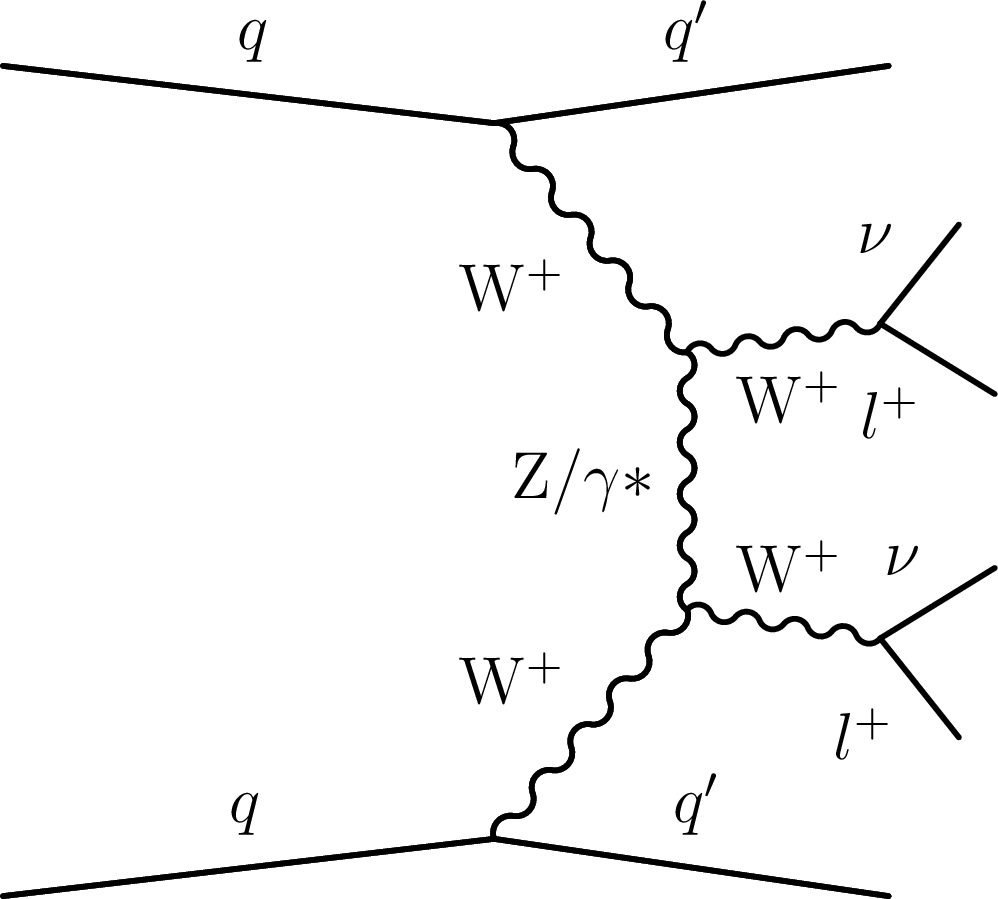
png pdf |
Figure 1-a:
Illustrative Feynman diagram of VBS process, where W bosons are radiated from incoming quarks (q), contributing to the EW-induced production of events containing two forward jets and $ {\mathrm{W} ^\pm \mathrm{W} ^\pm} $ boson pairs decaying to leptons, with triple gauge coupling vertex. |

png pdf |
Figure 1-b:
Illustrative Feynman diagram of VBS process, where W bosons are radiated from incoming quarks (q), contributing to the EW-induced production of events containing two forward jets and $ {\mathrm{W} ^\pm \mathrm{W} ^\pm} $ boson pairs decaying to leptons, with quartic gauge coupling vertex. |
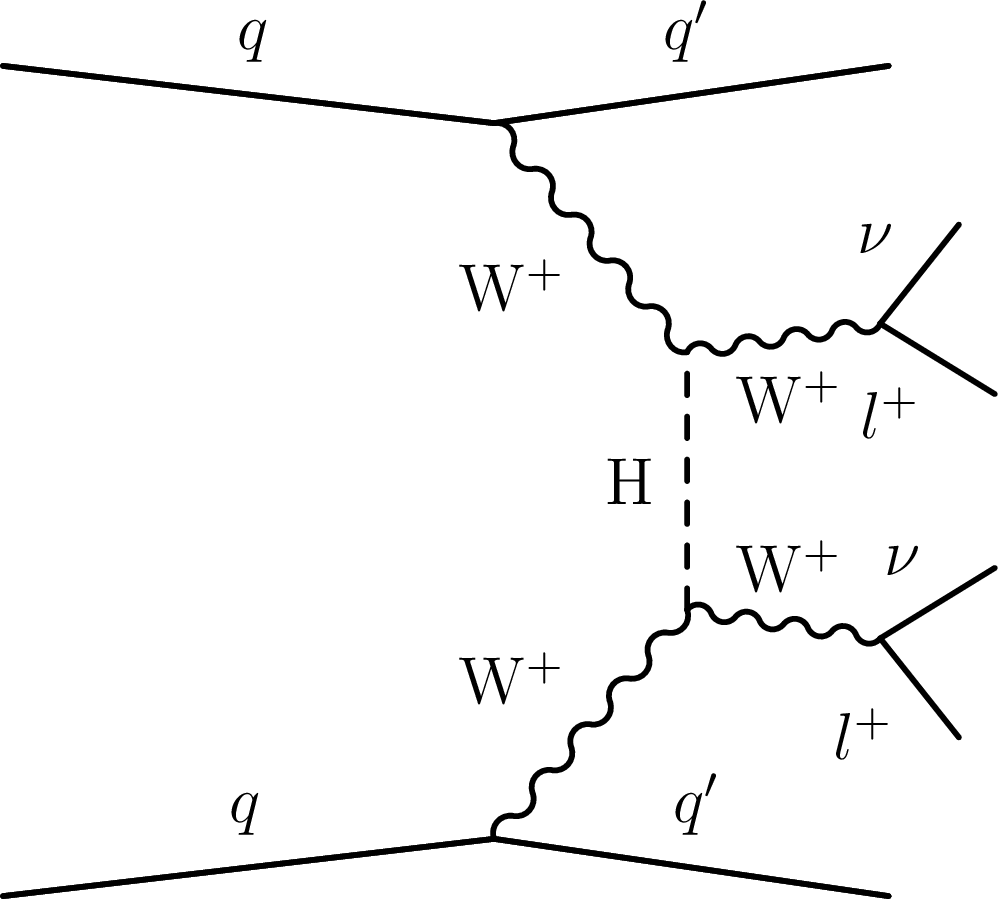
png pdf |
Figure 1-c:
Illustrative Feynman diagram of VBS process, where W bosons are radiated from incoming quarks (q), contributing to the EW-induced production of events containing two forward jets and $ {\mathrm{W} ^\pm \mathrm{W} ^\pm} $ boson pairs decaying to leptons, with $t$-channel Higgs boson exchange. |

png pdf |
Figure 2:
Generator level distributions of $ {\Delta \phi _{{\mathrm {j}} {\mathrm {j}}}} $ (upper), $\Delta \phi _{\ell \ell}$ (center), and $ {m_{\ell \ell}} $ (lower) in the fiducial region for the $ {\mathrm{W} ^\pm _{\mathrm {L}}\mathrm{W} ^\pm _{\mathrm {L}}} $, $ {\mathrm{W} ^\pm _{\mathrm {L}}\mathrm{W} ^\pm _{\mathrm {T}}} $, and $ {\mathrm{W} ^\pm _{\mathrm {T}}\mathrm{W} ^\pm _{\mathrm {T}}} $ processes with the helicity eigenstates defined in the parton-parton (left) and $ {\mathrm{W} ^\pm \mathrm{W} ^\pm} $ (right) center-of-mass reference frames. The error bars represent the uncertainties associated with the limited numbers of simulated events. |

png pdf |
Figure 2-a:
Generator level distributions of $ {\Delta \phi _{{\mathrm {j}} {\mathrm {j}}}} $ in the fiducial region for the $ {\mathrm{W} ^\pm _{\mathrm {L}}\mathrm{W} ^\pm _{\mathrm {L}}} $, $ {\mathrm{W} ^\pm _{\mathrm {L}}\mathrm{W} ^\pm _{\mathrm {T}}} $, and $ {\mathrm{W} ^\pm _{\mathrm {T}}\mathrm{W} ^\pm _{\mathrm {T}}} $ processes with the helicity eigenstates defined in the parton-parton center-of-mass reference frame. The error bars represent the uncertainties associated with the limited numbers of simulated events. |

png pdf |
Figure 2-b:
Generator level distributions of $ {\Delta \phi _{{\mathrm {j}} {\mathrm {j}}}} $ in the fiducial region for the $ {\mathrm{W} ^\pm _{\mathrm {L}}\mathrm{W} ^\pm _{\mathrm {L}}} $, $ {\mathrm{W} ^\pm _{\mathrm {L}}\mathrm{W} ^\pm _{\mathrm {T}}} $, and $ {\mathrm{W} ^\pm _{\mathrm {T}}\mathrm{W} ^\pm _{\mathrm {T}}} $ processes with the helicity eigenstates defined in the $ {\mathrm{W} ^\pm \mathrm{W} ^\pm} $ center-of-mass reference frame. The error bars represent the uncertainties associated with the limited numbers of simulated events. |
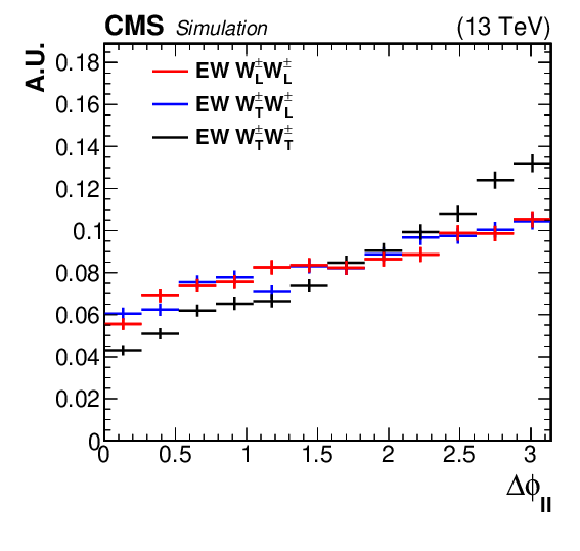
png pdf |
Figure 2-c:
Generator level distributions of $\Delta \phi _{\ell \ell}$ in the fiducial region for the $ {\mathrm{W} ^\pm _{\mathrm {L}}\mathrm{W} ^\pm _{\mathrm {L}}} $, $ {\mathrm{W} ^\pm _{\mathrm {L}}\mathrm{W} ^\pm _{\mathrm {T}}} $, and $ {\mathrm{W} ^\pm _{\mathrm {T}}\mathrm{W} ^\pm _{\mathrm {T}}} $ processes with the helicity eigenstates defined in the parton-parton center-of-mass reference frame. The error bars represent the uncertainties associated with the limited numbers of simulated events. |
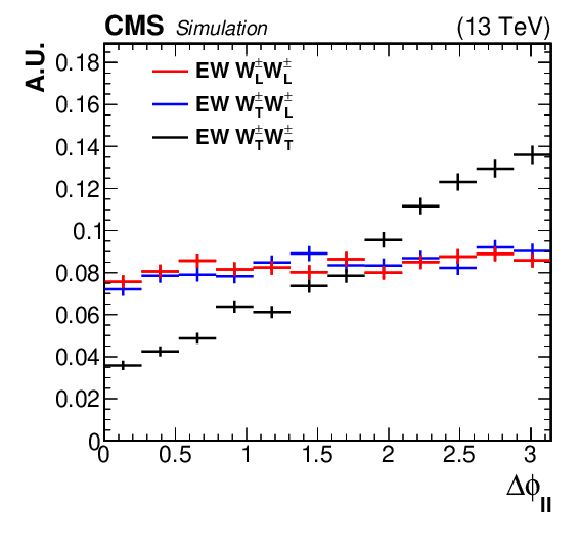
png pdf |
Figure 2-d:
Generator level distributions of $\Delta \phi _{\ell \ell}$ in the fiducial region for the $ {\mathrm{W} ^\pm _{\mathrm {L}}\mathrm{W} ^\pm _{\mathrm {L}}} $, $ {\mathrm{W} ^\pm _{\mathrm {L}}\mathrm{W} ^\pm _{\mathrm {T}}} $, and $ {\mathrm{W} ^\pm _{\mathrm {T}}\mathrm{W} ^\pm _{\mathrm {T}}} $ processes with the helicity eigenstates defined in the $ {\mathrm{W} ^\pm \mathrm{W} ^\pm} $ center-of-mass reference frame. The error bars represent the uncertainties associated with the limited numbers of simulated events. |
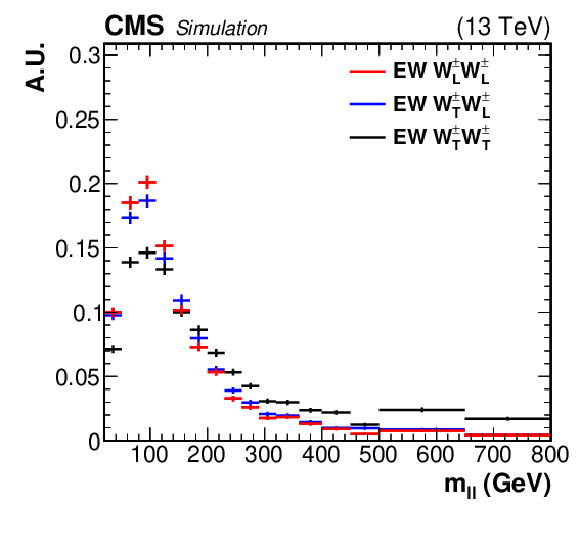
png pdf |
Figure 2-e:
Generator level distributions of $ {m_{\ell \ell}} $ in the fiducial region for the $ {\mathrm{W} ^\pm _{\mathrm {L}}\mathrm{W} ^\pm _{\mathrm {L}}} $, $ {\mathrm{W} ^\pm _{\mathrm {L}}\mathrm{W} ^\pm _{\mathrm {T}}} $, and $ {\mathrm{W} ^\pm _{\mathrm {T}}\mathrm{W} ^\pm _{\mathrm {T}}} $ processes with the helicity eigenstates defined in the parton-parton center-of-mass reference frame. The error bars represent the uncertainties associated with the limited numbers of simulated events. |
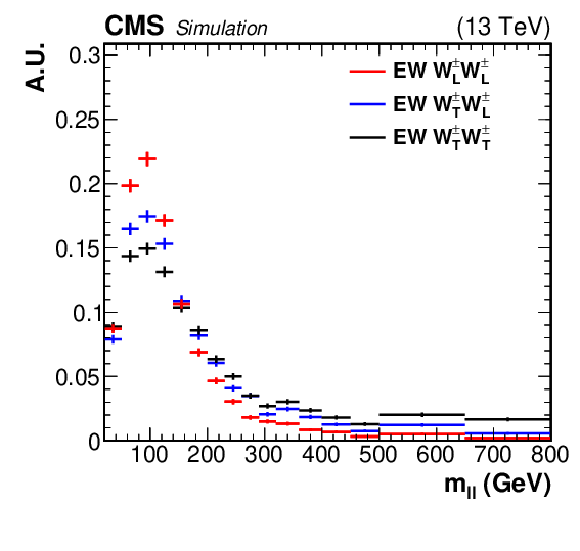
png pdf |
Figure 2-f:
Generator level distributions of $ {m_{\ell \ell}} $ in the fiducial region for the $ {\mathrm{W} ^\pm _{\mathrm {L}}\mathrm{W} ^\pm _{\mathrm {L}}} $, $ {\mathrm{W} ^\pm _{\mathrm {L}}\mathrm{W} ^\pm _{\mathrm {T}}} $, and $ {\mathrm{W} ^\pm _{\mathrm {T}}\mathrm{W} ^\pm _{\mathrm {T}}} $ processes with the helicity eigenstates defined in the $ {\mathrm{W} ^\pm \mathrm{W} ^\pm} $ center-of-mass reference frame. The error bars represent the uncertainties associated with the limited numbers of simulated events. |
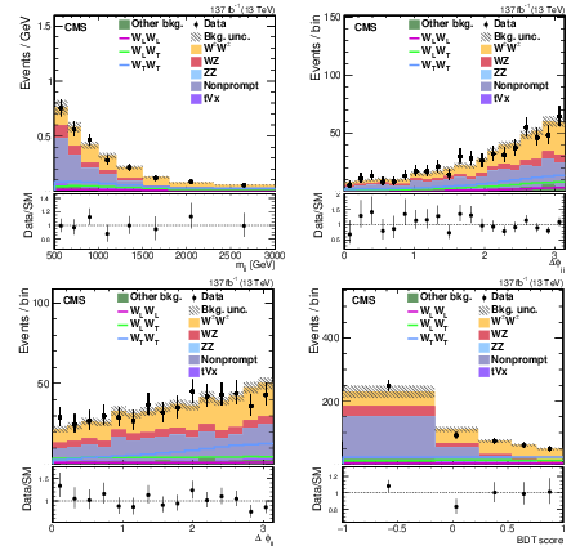
png pdf |
Figure 3:
Distributions of the $ {m_{{\mathrm {j}} {\mathrm {j}}}} $ (upper left), $ {\Delta \phi _{{\mathrm {j}} {\mathrm {j}}}} $ (upper right), $\Delta \phi _{\ell \ell}$ (lower left), and of the output score of the inclusive BDT (lower right) in the $ {\mathrm{W} ^\pm \mathrm{W} ^\pm} $ SR. The predicted yields are shown with their best fit normalizations from the simultaneous fit. The histograms for the $ {\mathrm{W} ^\pm \mathrm{W} ^\pm} $ process include the contributions from the $ {\mathrm{W} ^\pm _{\mathrm {L}}\mathrm{W} ^\pm _{\mathrm {L}}} $, $ {\mathrm{W} ^\pm _{\mathrm {L}}\mathrm{W} ^\pm _{\mathrm {T}}} $, and $ {\mathrm{W} ^\pm _{\mathrm {T}}\mathrm{W} ^\pm _{\mathrm {T}}} $ processes (shown as solid lines), QCD $ {\mathrm{W} ^\pm \mathrm{W} ^\pm} $, and interference. The histograms for other backgrounds include the contributions from double parton scattering, VVV, and from oppositely charged dilepton final states from ${\mathrm{t} \mathrm{\bar{t}}} $, $\mathrm{t} \mathrm{W} $, $\mathrm{W} ^{+}\mathrm{W} ^{-}$, and Drell-Yan processes. The overflow is included in the last bin. The bottom panel in each figure shows the ratio of the number of events observed in data to that of the total SM prediction. The gray bands represent the uncertainties in the predicted yields. The vertical bars represent the statistical uncertainties in the data. |
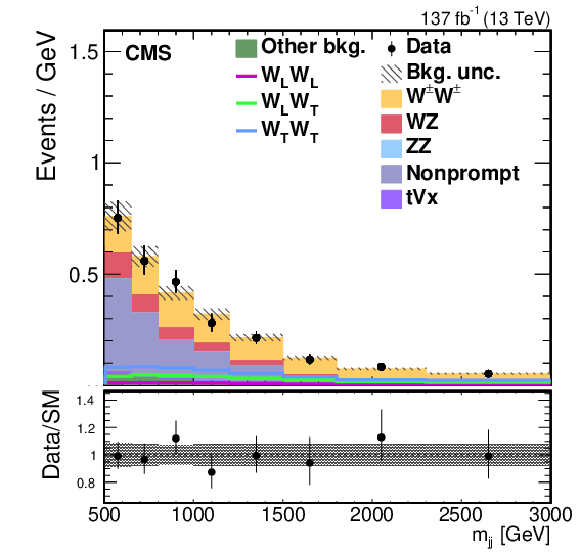
png pdf |
Figure 3-a:
Distribution of $ {m_{{\mathrm {j}} {\mathrm {j}}}} $ in the $ {\mathrm{W} ^\pm \mathrm{W} ^\pm} $ SR. The predicted yields are shown with their best fit normalizations from the simultaneous fit. The histograms for the $ {\mathrm{W} ^\pm \mathrm{W} ^\pm} $ process include the contributions from the $ {\mathrm{W} ^\pm _{\mathrm {L}}\mathrm{W} ^\pm _{\mathrm {L}}} $, $ {\mathrm{W} ^\pm _{\mathrm {L}}\mathrm{W} ^\pm _{\mathrm {T}}} $, and $ {\mathrm{W} ^\pm _{\mathrm {T}}\mathrm{W} ^\pm _{\mathrm {T}}} $ processes (shown as solid lines), QCD $ {\mathrm{W} ^\pm \mathrm{W} ^\pm} $, and interference. The histograms for other backgrounds include the contributions from double parton scattering, VVV, and from oppositely charged dilepton final states from ${\mathrm{t} \mathrm{\bar{t}}} $, $\mathrm{t} \mathrm{W} $, $\mathrm{W} ^{+}\mathrm{W} ^{-}$, and Drell-Yan processes. The overflow is included in the last bin. The bottom panel shows the ratio of the number of events observed in data to that of the total SM prediction. The gray bands represent the uncertainties in the predicted yields. The vertical bars represent the statistical uncertainties in the data. |
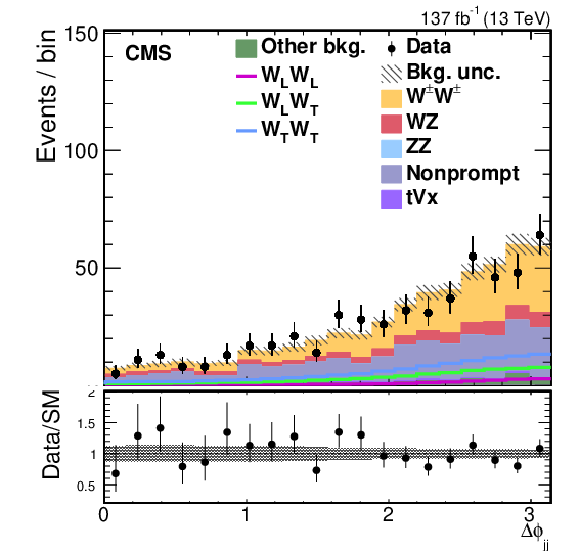
png pdf |
Figure 3-b:
Distribution of $ {\Delta \phi _{{\mathrm {j}} {\mathrm {j}}}} $ in the $ {\mathrm{W} ^\pm \mathrm{W} ^\pm} $ SR. The predicted yields are shown with their best fit normalizations from the simultaneous fit. The histograms for the $ {\mathrm{W} ^\pm \mathrm{W} ^\pm} $ process include the contributions from the $ {\mathrm{W} ^\pm _{\mathrm {L}}\mathrm{W} ^\pm _{\mathrm {L}}} $, $ {\mathrm{W} ^\pm _{\mathrm {L}}\mathrm{W} ^\pm _{\mathrm {T}}} $, and $ {\mathrm{W} ^\pm _{\mathrm {T}}\mathrm{W} ^\pm _{\mathrm {T}}} $ processes (shown as solid lines), QCD $ {\mathrm{W} ^\pm \mathrm{W} ^\pm} $, and interference. The histograms for other backgrounds include the contributions from double parton scattering, VVV, and from oppositely charged dilepton final states from ${\mathrm{t} \mathrm{\bar{t}}} $, $\mathrm{t} \mathrm{W} $, $\mathrm{W} ^{+}\mathrm{W} ^{-}$, and Drell-Yan processes. The overflow is included in the last bin. The bottom panel shows the ratio of the number of events observed in data to that of the total SM prediction. The gray bands represent the uncertainties in the predicted yields. The vertical bars represent the statistical uncertainties in the data. |
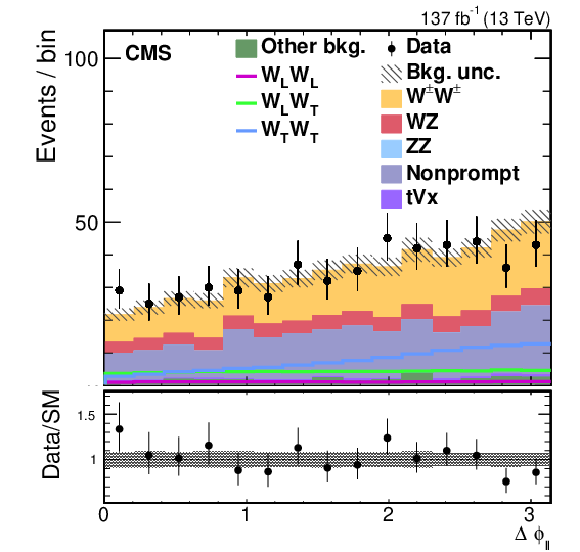
png pdf |
Figure 3-c:
Distribution of $\Delta \phi _{\ell \ell}$ in the $ {\mathrm{W} ^\pm \mathrm{W} ^\pm} $ SR. The predicted yields are shown with their best fit normalizations from the simultaneous fit. The histograms for the $ {\mathrm{W} ^\pm \mathrm{W} ^\pm} $ process include the contributions from the $ {\mathrm{W} ^\pm _{\mathrm {L}}\mathrm{W} ^\pm _{\mathrm {L}}} $, $ {\mathrm{W} ^\pm _{\mathrm {L}}\mathrm{W} ^\pm _{\mathrm {T}}} $, and $ {\mathrm{W} ^\pm _{\mathrm {T}}\mathrm{W} ^\pm _{\mathrm {T}}} $ processes (shown as solid lines), QCD $ {\mathrm{W} ^\pm \mathrm{W} ^\pm} $, and interference. The histograms for other backgrounds include the contributions from double parton scattering, VVV, and from oppositely charged dilepton final states from ${\mathrm{t} \mathrm{\bar{t}}} $, $\mathrm{t} \mathrm{W} $, $\mathrm{W} ^{+}\mathrm{W} ^{-}$, and Drell-Yan processes. The overflow is included in the last bin. The bottom panel shows the ratio of the number of events observed in data to that of the total SM prediction. The gray bands represent the uncertainties in the predicted yields. The vertical bars represent the statistical uncertainties in the data. |
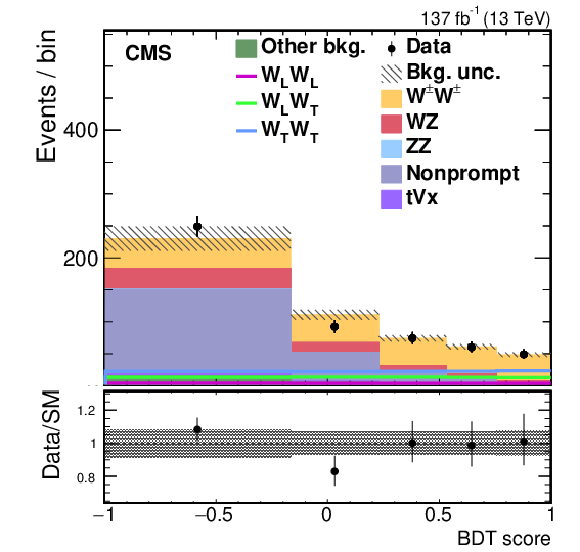
png pdf |
Figure 3-d:
Distribution of the output score of the inclusive BDT in the $ {\mathrm{W} ^\pm \mathrm{W} ^\pm} $ SR. The predicted yields are shown with their best fit normalizations from the simultaneous fit. The histograms for the $ {\mathrm{W} ^\pm \mathrm{W} ^\pm} $ process include the contributions from the $ {\mathrm{W} ^\pm _{\mathrm {L}}\mathrm{W} ^\pm _{\mathrm {L}}} $, $ {\mathrm{W} ^\pm _{\mathrm {L}}\mathrm{W} ^\pm _{\mathrm {T}}} $, and $ {\mathrm{W} ^\pm _{\mathrm {T}}\mathrm{W} ^\pm _{\mathrm {T}}} $ processes (shown as solid lines), QCD $ {\mathrm{W} ^\pm \mathrm{W} ^\pm} $, and interference. The histograms for other backgrounds include the contributions from double parton scattering, VVV, and from oppositely charged dilepton final states from ${\mathrm{t} \mathrm{\bar{t}}} $, $\mathrm{t} \mathrm{W} $, $\mathrm{W} ^{+}\mathrm{W} ^{-}$, and Drell-Yan processes. The overflow is included in the last bin. The bottom panel shows the ratio of the number of events observed in data to that of the total SM prediction. The gray bands represent the uncertainties in the predicted yields. The vertical bars represent the statistical uncertainties in the data. |
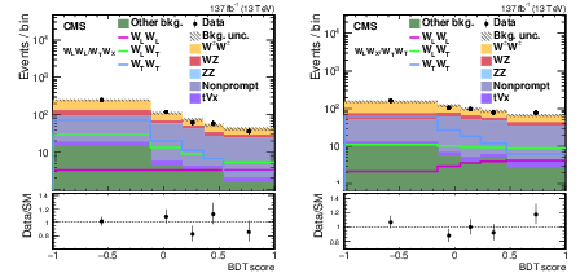
png pdf |
Figure 4:
Distributions of the output score of the signal BDT used for the $ {\mathrm{W} ^\pm _{\mathrm {L}}\mathrm{W} ^\pm _{\mathrm {L}}} $ and $ {\mathrm{W} ^\pm _{X}\mathrm{W} ^\pm _{\mathrm {T}}} $ cross section measurements (left) and of the output score of the signal BDT used for the $ {\mathrm{W} ^\pm _{\mathrm {L}}\mathrm{W} ^\pm _{X}} $ and $ {\mathrm{W} ^\pm _{\mathrm {T}}\mathrm{W} ^\pm _{\mathrm {T}}} $ cross section measurements (right). The predicted yields are shown with their best fit normalizations from the simultaneous fit. The histograms for the $ {\mathrm{W} ^\pm \mathrm{W} ^\pm} $ process include the contributions from the $ {\mathrm{W} ^\pm _{\mathrm {L}}\mathrm{W} ^\pm _{\mathrm {L}}} $, $ {\mathrm{W} ^\pm _{\mathrm {L}}\mathrm{W} ^\pm _{\mathrm {T}}} $, and $ {\mathrm{W} ^\pm _{\mathrm {T}}\mathrm{W} ^\pm _{\mathrm {T}}} $ processes (shown as solid lines), QCD $ {\mathrm{W} ^\pm \mathrm{W} ^\pm} $, and interference. The histograms for other backgrounds include the contributions from double parton scattering, VVV, and from oppositely charged dilepton final states from ${\mathrm{t} \mathrm{\bar{t}}} $, $\mathrm{t} \mathrm{W} $, $\mathrm{W} ^{+}\mathrm{W} ^{-}$, and Drell-Yan processes. The bottom panel in each figure shows the ratio of the number of events observed in data to that of the total SM prediction. The gray bands represent the uncertainties in the predicted yields. The vertical bars represent the statistical uncertainties in the data. |
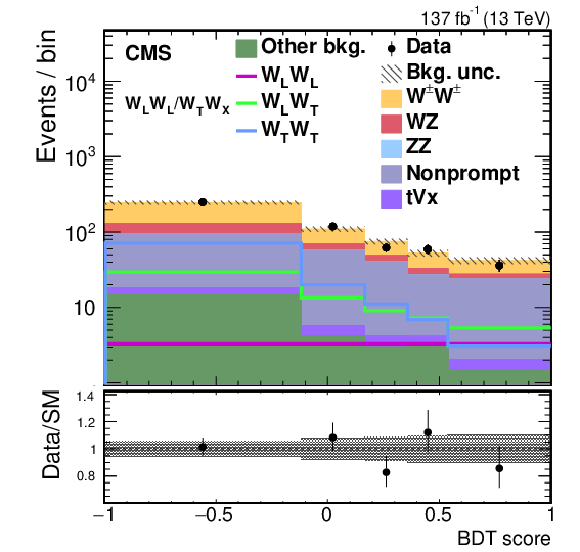
png pdf |
Figure 4-a:
Distribution of the output score of the signal BDT used for the $ {\mathrm{W} ^\pm _{\mathrm {L}}\mathrm{W} ^\pm _{\mathrm {L}}} $ and $ {\mathrm{W} ^\pm _{X}\mathrm{W} ^\pm _{\mathrm {T}}} $ cross section measurements. The predicted yields are shown with their best fit normalizations from the simultaneous fit. The histograms for the $ {\mathrm{W} ^\pm \mathrm{W} ^\pm} $ process include the contributions from the $ {\mathrm{W} ^\pm _{\mathrm {L}}\mathrm{W} ^\pm _{\mathrm {L}}} $, $ {\mathrm{W} ^\pm _{\mathrm {L}}\mathrm{W} ^\pm _{\mathrm {T}}} $, and $ {\mathrm{W} ^\pm _{\mathrm {T}}\mathrm{W} ^\pm _{\mathrm {T}}} $ processes (shown as solid lines), QCD $ {\mathrm{W} ^\pm \mathrm{W} ^\pm} $, and interference. The histograms for other backgrounds include the contributions from double parton scattering, VVV, and from oppositely charged dilepton final states from ${\mathrm{t} \mathrm{\bar{t}}} $, $\mathrm{t} \mathrm{W} $, $\mathrm{W} ^{+}\mathrm{W} ^{-}$, and Drell-Yan processes. The bottom panel in each figure shows the ratio of the number of events observed in data to that of the total SM prediction. The gray bands represent the uncertainties in the predicted yields. The vertical bars represent the statistical uncertainties in the data. |

png pdf |
Figure 4-b:
Distribution of the output score of the signal BDT used for the $ {\mathrm{W} ^\pm _{\mathrm {L}}\mathrm{W} ^\pm _{X}} $ and $ {\mathrm{W} ^\pm _{\mathrm {T}}\mathrm{W} ^\pm _{\mathrm {T}}} $ cross section measurements. The predicted yields are shown with their best fit normalizations from the simultaneous fit. The histograms for the $ {\mathrm{W} ^\pm \mathrm{W} ^\pm} $ process include the contributions from the $ {\mathrm{W} ^\pm _{\mathrm {L}}\mathrm{W} ^\pm _{\mathrm {L}}} $, $ {\mathrm{W} ^\pm _{\mathrm {L}}\mathrm{W} ^\pm _{\mathrm {T}}} $, and $ {\mathrm{W} ^\pm _{\mathrm {T}}\mathrm{W} ^\pm _{\mathrm {T}}} $ processes (shown as solid lines), QCD $ {\mathrm{W} ^\pm \mathrm{W} ^\pm} $, and interference. The histograms for other backgrounds include the contributions from double parton scattering, VVV, and from oppositely charged dilepton final states from ${\mathrm{t} \mathrm{\bar{t}}} $, $\mathrm{t} \mathrm{W} $, $\mathrm{W} ^{+}\mathrm{W} ^{-}$, and Drell-Yan processes. The bottom panel in each figure shows the ratio of the number of events observed in data to that of the total SM prediction. The gray bands represent the uncertainties in the predicted yields. The vertical bars represent the statistical uncertainties in the data. |
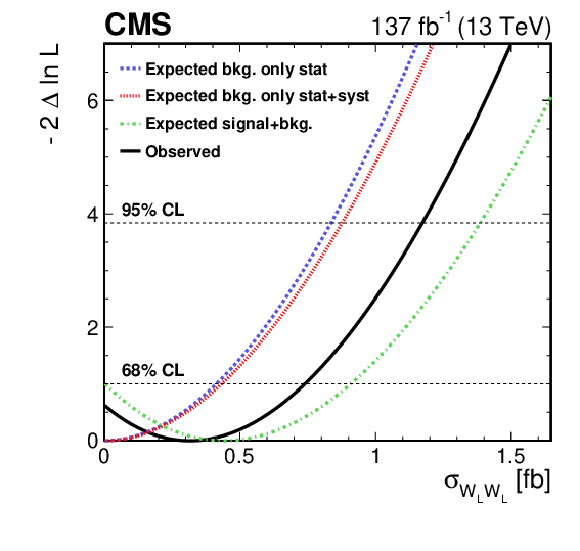
png pdf |
Figure 5:
Profile likelihood scan as a function of the $ {\mathrm{W} ^\pm _{\mathrm {L}}\mathrm{W} ^\pm _{\mathrm {L}}} $ cross section. The red (blue) line represents the expected values in the background-only hypothesis, i.e., assuming no contribution from the $ {\mathrm{W} ^\pm _{\mathrm {L}}\mathrm{W} ^\pm _{\mathrm {L}}} $ process, considering all systematic uncertainties (only statistical ones). The green line shows the expected values for the signal-plus-background hypothesis. The observed values are represented by the black line. |
| Tables | |
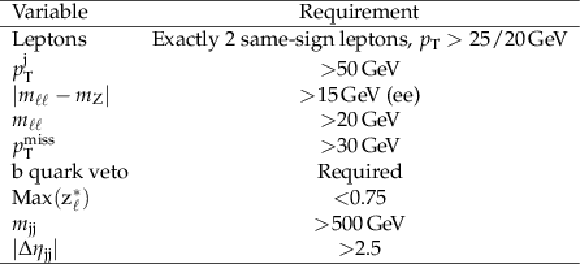
png pdf |
Table 1:
Summary of the requirements defining the $ {\mathrm{W} ^\pm \mathrm{W} ^\pm} $ SR. The $ {| {m_{\ell \ell}} - m_{\mathrm{Z}} |}$ requirement is applied to the dielectron final state only. |
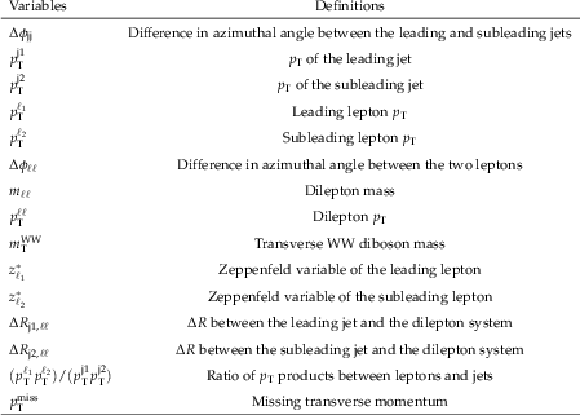
png pdf |
Table 2:
List and description of all the input variables for the signal BDT trainings. |
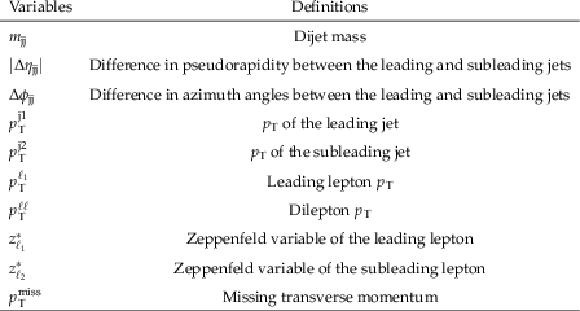
png pdf |
Table 3:
List and description of the input variables for the inclusive BDT training. |
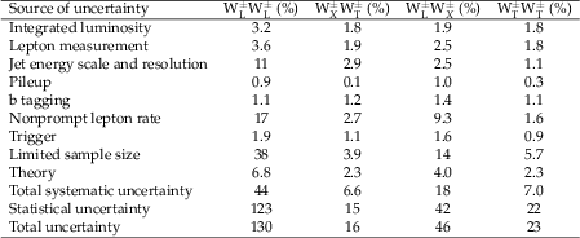
png pdf |
Table 4:
Systematic uncertainties of the $ {\mathrm{W} ^\pm _{\mathrm {L}}\mathrm{W} ^\pm _{\mathrm {L}}} $ and $ {\mathrm{W} ^\pm _{X}\mathrm{W} ^\pm _{\mathrm {T}}} $, and $ {\mathrm{W} ^\pm _{\mathrm {L}}\mathrm{W} ^\pm _{X}} $ and $ {\mathrm{W} ^\pm _{\mathrm {T}}\mathrm{W} ^\pm _{\mathrm {T}}} $ cross section measurements in units of percent. |
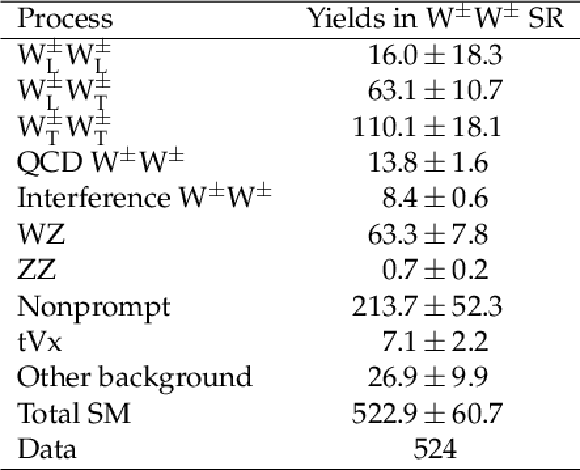
png pdf |
Table 5:
Expected yields from various SM processes and observed data events in $ {\mathrm{W} ^\pm \mathrm{W} ^\pm} $ SR. The combination of the statistical and systematic uncertainties is shown. The expected yields are shown with their best fit normalizations from the simultaneous fit for the $ {\mathrm{W} ^\pm _{\mathrm {L}}\mathrm{W} ^\pm _{\mathrm {L}}} $ and $ {\mathrm{W} ^\pm _{X}\mathrm{W} ^\pm _{\mathrm {T}}} $ cross sections. The $ {\mathrm{W} ^\pm _{\mathrm {L}}\mathrm{W} ^\pm _{\mathrm {T}}} $ and $ {\mathrm{W} ^\pm _{\mathrm {T}}\mathrm{W} ^\pm _{\mathrm {T}}} $ yields are obtained from the $ {\mathrm{W} ^\pm _{X}\mathrm{W} ^\pm _{\mathrm {T}}} $ yield assuming the SM prediction for the ratio of the yields. The $ {\mathrm{t} \mathrm{V} \mathrm {x}} $ background yield includes the contributions from ${\mathrm{t} \mathrm{\bar{t}}} \mathrm{V} $ and $ {\mathrm{t} \mathrm{Z} \mathrm{q}} $ processes. |

png pdf |
Table 6:
Measured fiducial cross sections for the $ {\mathrm{W} ^\pm _{\mathrm {L}}\mathrm{W} ^\pm _{\mathrm {L}}} $ and $ {\mathrm{W} ^\pm _{X}\mathrm{W} ^\pm _{\mathrm {T}}} $ processes, and for the $ {\mathrm{W} ^\pm _{\mathrm {L}}\mathrm{W} ^\pm _{X}} $ and $ {\mathrm{W} ^\pm _{\mathrm {T}}\mathrm{W} ^\pm _{\mathrm {T}}} $ processes for the helicity eigenstates defined in the $ {\mathrm{W} ^\pm \mathrm{W} ^\pm} $ center-of-mass frame. The combination of the statistical and systematic uncertainties is shown. The theoretical predictions including the $\mathcal {O}({\alpha _\mathrm {S}} \alpha ^6)$ and $\mathcal {O}(\alpha ^7)$ corrections to the MadGraph 5\_aMC@NLO LO cross sections, as described in the text, are also shown. The theoretical uncertainties include statistical, PDF, and LO scale uncertainties; $\mathcal {B}$ is the branching fraction for $\mathrm{W} \mathrm{W} \to \ell \nu \ell '\nu $ [55]. |

png pdf |
Table 7:
Measured fiducial cross sections for the $ {\mathrm{W} ^\pm _{\mathrm {L}}\mathrm{W} ^\pm _{\mathrm {L}}} $ and $ {\mathrm{W} ^\pm _{X}\mathrm{W} ^\pm _{\mathrm {T}}} $ processes, and for the $ {\mathrm{W} ^\pm _{\mathrm {L}}\mathrm{W} ^\pm _{X}} $ and $ {\mathrm{W} ^\pm _{\mathrm {T}}\mathrm{W} ^\pm _{\mathrm {T}}} $ processes for the helicity eigenstates defined in the parton-parton center-of-mass frame. The combination of the statistical and systematic uncertainties is shown. The theoretical predictions including the $\mathcal {O}({\alpha _\mathrm {S}} \alpha ^6)$ and $\mathcal {O}(\alpha ^7)$ corrections to the MadGraph 5\_aMC@NLO LO cross sections, as described in the text, are also shown. The theoretical uncertainties include statistical, PDF, and LO scale uncertainties; $\mathcal {B}$ is the branching fraction for $\mathrm{W} \mathrm{W} \to \ell \nu \ell '\nu $ [55]. |
| Summary |
| The first measurements of production cross sections for polarized same-sign ${\mathrm{W}^\pm\mathrm{W}^\pm} $ boson pairs are reported. The measurements are based on a sample of proton-proton collisions at a center-of-mass energy of 13 TeV collected by the CMS detector at the LHC, corresponding to an integrated luminosity of 137 fb$^{-1}$ . Events are selected by requiring exactly two same-sign leptons (electrons or muons), moderate missing transverse momentum, and two jets with a large rapidity separation and a high dijet mass. Boosted decision trees are used to separate between the polarized scattering processes by exploiting the kinematic differences. An observed (expected) 95% confidence level upper limit on the production cross section for longitudinally polarized same-sign ${\mathrm{W}^\pm\mathrm{W}^\pm} $ boson pairs of 1.17 (0.88) fb is reported with the helicity eigenstates defined in the ${\mathrm{W}^\pm\mathrm{W}^\pm} $ center-of-mass reference frame. The electroweak production of the ${\mathrm{W}^\pm\mathrm{W}^\pm} $ boson pairs where at least one of the W bosons is longitudinally polarized is measured with an observed (expected) significance of 2.3 (3.1) standard deviations. Results are also reported with the polarizations defined in the parton-parton center-of-mass reference frame. The measured cross section values agree with the standard model predictions. |
| Additional Figures | |
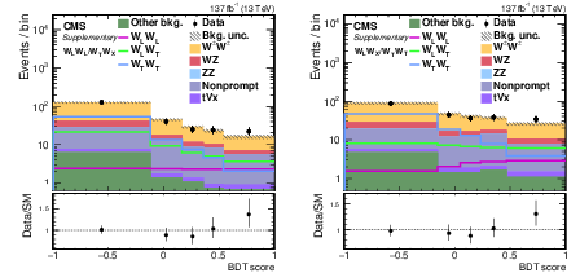
png pdf |
Additional Figure 1:
Distributions of the output score of the signal BDT used for the $ {{\mathrm {W}}^\pm _{\mathrm {L}} {\mathrm {W}}^\pm _{\mathrm {L}}} $ and $ {{\mathrm {W}}^\pm _{\mathrm {X}} {\mathrm {W}}^\pm _{\mathrm {T}}} $ cross section measurements (left) and of the output score of the signal BDT used for the $ {{\mathrm {W}}^\pm _{\mathrm {L}} {\mathrm {W}}^\pm _{\mathrm {X}}} $ and $ {{\mathrm {W}}^\pm _{\mathrm {T}} {\mathrm {W}}^\pm _{\mathrm {T}}} $ cross section measurements (right), after requiring the output score of the inclusive BDT greater than 0. The predicted yields are shown with their best fit normalizations from the simultaneous fit. The histograms for $ {{\mathrm {W}}^\pm {\mathrm {W}}^\pm} $ process include the contributions from the $ {{\mathrm {W}}^\pm _{\mathrm {L}} {\mathrm {W}}^\pm _{\mathrm {L}}} $, $ {{\mathrm {W}}^\pm _{\mathrm {L}} {\mathrm {W}}^\pm _{\mathrm {T}}} $, and $ {{\mathrm {W}}^\pm _{\mathrm {T}} {\mathrm {W}}^\pm _{\mathrm {T}}} $ processes (shown as solid lines), QCD $ {{\mathrm {W}}^\pm {\mathrm {W}}^\pm} $, and interference. The histograms for $\mathrm{tVx}$ backgrounds include the contributions from $ {{\mathrm {t}\overline {\mathrm {t}}}} \mathrm{V}$ and $ {\mathrm {t} {\mathrm {Z}} {\mathrm {q}}} $ processes. The histograms for other backgrounds include the contributions from double parton scattering and VVV processes. The bottom panel in each figure shows the ratio of the number of events observed in data to that of the total SM prediction. The gray bands represent the uncertainties in the predicted yields. |
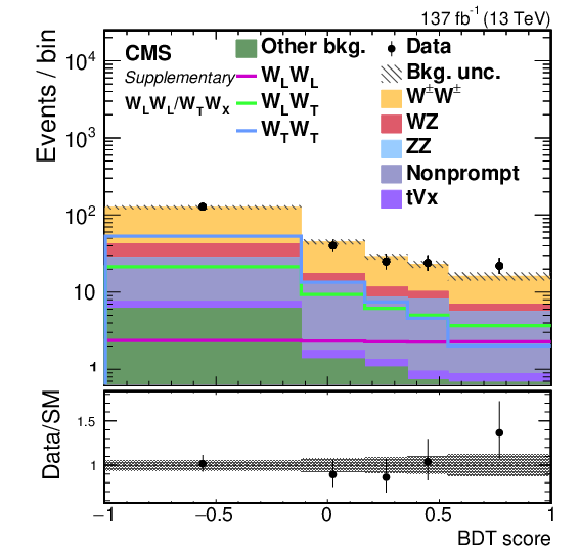
png pdf |
Additional Figure 1-a:
Distribution of the output score of the signal BDT used for the $ {{\mathrm {W}}^\pm _{\mathrm {L}} {\mathrm {W}}^\pm _{\mathrm {L}}} $ and $ {{\mathrm {W}}^\pm _{\mathrm {X}} {\mathrm {W}}^\pm _{\mathrm {T}}} $ cross section measurements, after requiring the output score of the inclusive BDT greater than 0. The predicted yields are shown with their best fit normalizations from the simultaneous fit. The histograms for $ {{\mathrm {W}}^\pm {\mathrm {W}}^\pm} $ process include the contributions from the $ {{\mathrm {W}}^\pm _{\mathrm {L}} {\mathrm {W}}^\pm _{\mathrm {L}}} $, $ {{\mathrm {W}}^\pm _{\mathrm {L}} {\mathrm {W}}^\pm _{\mathrm {T}}} $, and $ {{\mathrm {W}}^\pm _{\mathrm {T}} {\mathrm {W}}^\pm _{\mathrm {T}}} $ processes (shown as solid lines), QCD $ {{\mathrm {W}}^\pm {\mathrm {W}}^\pm} $, and interference. The histograms for $\mathrm{tVx}$ backgrounds include the contributions from $ {{\mathrm {t}\overline {\mathrm {t}}}} \mathrm{V}$ and $ {\mathrm {t} {\mathrm {Z}} {\mathrm {q}}} $ processes. The histograms for other backgrounds include the contributions from double parton scattering and VVV processes. The bottom panel shows the ratio of the number of events observed in data to that of the total SM prediction. The gray bands represent the uncertainties in the predicted yields. |

png pdf |
Additional Figure 1-b:
Distribution of the output score of the signal BDT used for the $ {{\mathrm {W}}^\pm _{\mathrm {L}} {\mathrm {W}}^\pm _{\mathrm {X}}} $ and $ {{\mathrm {W}}^\pm _{\mathrm {T}} {\mathrm {W}}^\pm _{\mathrm {T}}} $ cross section measurements, after requiring the output score of the inclusive BDT greater than 0. The predicted yields are shown with their best fit normalizations from the simultaneous fit. The histograms for $ {{\mathrm {W}}^\pm {\mathrm {W}}^\pm} $ process include the contributions from the $ {{\mathrm {W}}^\pm _{\mathrm {L}} {\mathrm {W}}^\pm _{\mathrm {L}}} $, $ {{\mathrm {W}}^\pm _{\mathrm {L}} {\mathrm {W}}^\pm _{\mathrm {T}}} $, and $ {{\mathrm {W}}^\pm _{\mathrm {T}} {\mathrm {W}}^\pm _{\mathrm {T}}} $ processes (shown as solid lines), QCD $ {{\mathrm {W}}^\pm {\mathrm {W}}^\pm} $, and interference. The histograms for $\mathrm{tVx}$ backgrounds include the contributions from $ {{\mathrm {t}\overline {\mathrm {t}}}} \mathrm{V}$ and $ {\mathrm {t} {\mathrm {Z}} {\mathrm {q}}} $ processes. The histograms for other backgrounds include the contributions from double parton scattering and VVV processes. The bottom panel shows the ratio of the number of events observed in data to that of the total SM prediction. The gray bands represent the uncertainties in the predicted yields. |
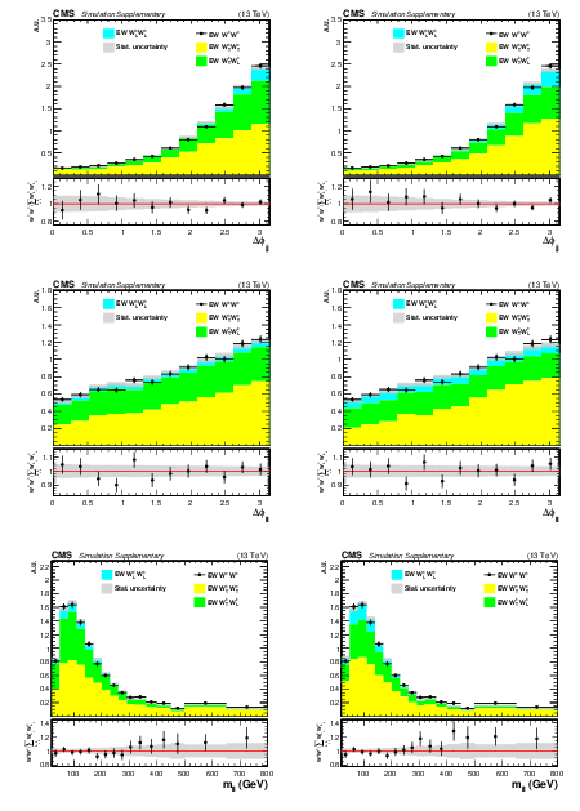
png pdf |
Additional Figure 2:
Generator level distributions of $ {\Delta \phi _{{\mathrm {j}} {\mathrm {j}}}} $ (upper), $\Delta \phi _{\ell \ell}$ (center), and $ {m_{\ell \ell}} $ (lower) in the fiducial region for the $ {{\mathrm {W}}^\pm _{\mathrm {L}} {\mathrm {W}}^\pm _{\mathrm {L}}} $, $ {{\mathrm {W}}^\pm _{\mathrm {L}} {\mathrm {W}}^\pm _{\mathrm {T}}} $, and $ {{\mathrm {W}}^\pm _{\mathrm {T}} {\mathrm {W}}^\pm _{\mathrm {T}}} $ processes with the helicity eigenstates defined in the parton-parton (left) and $ {{\mathrm {W}}^\pm {\mathrm {W}}^\pm} $ (right) center-of-mass reference frames. The distributions are also shown for the unpolarized EW $ {{\mathrm {W}}^\pm {\mathrm {W}}^\pm} $ process. The bottom panel in each figure shows the ratio of the contribution of the unpolarized $ {{\mathrm {W}}^\pm {\mathrm {W}}^\pm} $ process to that of the sum of the $ {{\mathrm {W}}^\pm _{\mathrm {L}} {\mathrm {W}}^\pm _{\mathrm {L}}} $, $ {{\mathrm {W}}^\pm _{\mathrm {L}} {\mathrm {W}}^\pm _{\mathrm {T}}} $, and $ {{\mathrm {W}}^\pm _{\mathrm {T}} {\mathrm {W}}^\pm _{\mathrm {T}}} $ processes. The gray bands represent the statistical uncertainties associated with the limited number of simulated events. |
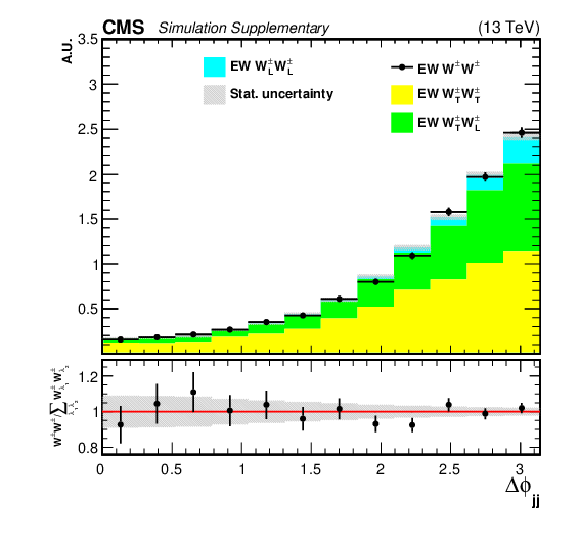
png pdf |
Additional Figure 2-a:
Generator level distributions of $ {\Delta \phi _{{\mathrm {j}} {\mathrm {j}}}} $ in the fiducial region for the $ {{\mathrm {W}}^\pm _{\mathrm {L}} {\mathrm {W}}^\pm _{\mathrm {L}}} $, $ {{\mathrm {W}}^\pm _{\mathrm {L}} {\mathrm {W}}^\pm _{\mathrm {T}}} $, and $ {{\mathrm {W}}^\pm _{\mathrm {T}} {\mathrm {W}}^\pm _{\mathrm {T}}} $ processes with the helicity eigenstates defined in the parton-parton center-of-mass reference frame. The distributions are also shown for the unpolarized EW $ {{\mathrm {W}}^\pm {\mathrm {W}}^\pm} $ process. The bottom panel shows the ratio of the contribution of the unpolarized $ {{\mathrm {W}}^\pm {\mathrm {W}}^\pm} $ process to that of the sum of the $ {{\mathrm {W}}^\pm _{\mathrm {L}} {\mathrm {W}}^\pm _{\mathrm {L}}} $, $ {{\mathrm {W}}^\pm _{\mathrm {L}} {\mathrm {W}}^\pm _{\mathrm {T}}} $, and $ {{\mathrm {W}}^\pm _{\mathrm {T}} {\mathrm {W}}^\pm _{\mathrm {T}}} $ processes. The gray bands represent the statistical uncertainties associated with the limited number of simulated events. |
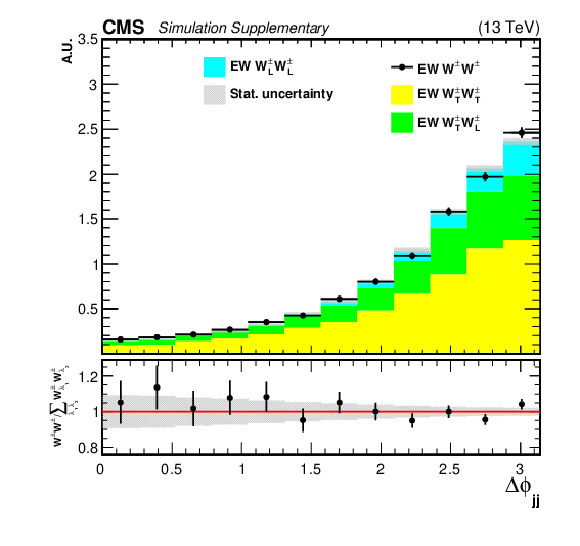
png pdf |
Additional Figure 2-b:
Generator level distributions of $ {\Delta \phi _{{\mathrm {j}} {\mathrm {j}}}} $ in the fiducial region for the $ {{\mathrm {W}}^\pm _{\mathrm {L}} {\mathrm {W}}^\pm _{\mathrm {L}}} $, $ {{\mathrm {W}}^\pm _{\mathrm {L}} {\mathrm {W}}^\pm _{\mathrm {T}}} $, and $ {{\mathrm {W}}^\pm _{\mathrm {T}} {\mathrm {W}}^\pm _{\mathrm {T}}} $ processes with the helicity eigenstates defined in the $ {{\mathrm {W}}^\pm {\mathrm {W}}^\pm} $ center-of-mass reference frame. The distributions are also shown for the unpolarized EW $ {{\mathrm {W}}^\pm {\mathrm {W}}^\pm} $ process. The bottom panel shows the ratio of the contribution of the unpolarized $ {{\mathrm {W}}^\pm {\mathrm {W}}^\pm} $ process to that of the sum of the $ {{\mathrm {W}}^\pm _{\mathrm {L}} {\mathrm {W}}^\pm _{\mathrm {L}}} $, $ {{\mathrm {W}}^\pm _{\mathrm {L}} {\mathrm {W}}^\pm _{\mathrm {T}}} $, and $ {{\mathrm {W}}^\pm _{\mathrm {T}} {\mathrm {W}}^\pm _{\mathrm {T}}} $ processes. The gray bands represent the statistical uncertainties associated with the limited number of simulated events. |
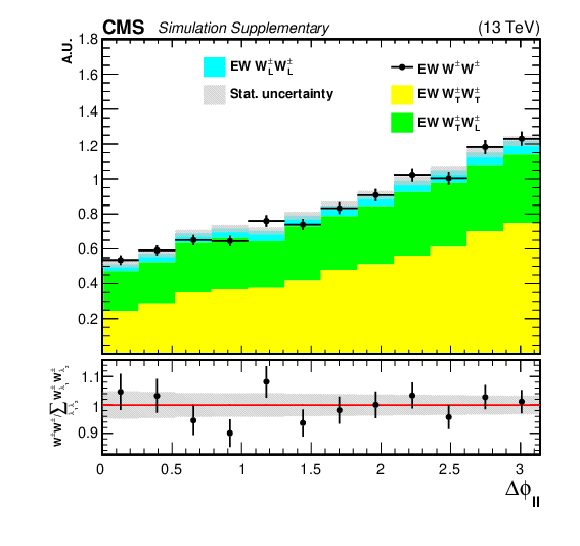
png pdf |
Additional Figure 2-c:
Generator level distributions of $\Delta \phi _{\ell \ell}$ in the fiducial region for the $ {{\mathrm {W}}^\pm _{\mathrm {L}} {\mathrm {W}}^\pm _{\mathrm {L}}} $, $ {{\mathrm {W}}^\pm _{\mathrm {L}} {\mathrm {W}}^\pm _{\mathrm {T}}} $, and $ {{\mathrm {W}}^\pm _{\mathrm {T}} {\mathrm {W}}^\pm _{\mathrm {T}}} $ processes with the helicity eigenstates defined in the parton-parton center-of-mass reference frame. The distributions are also shown for the unpolarized EW $ {{\mathrm {W}}^\pm {\mathrm {W}}^\pm} $ process. The bottom panel shows the ratio of the contribution of the unpolarized $ {{\mathrm {W}}^\pm {\mathrm {W}}^\pm} $ process to that of the sum of the $ {{\mathrm {W}}^\pm _{\mathrm {L}} {\mathrm {W}}^\pm _{\mathrm {L}}} $, $ {{\mathrm {W}}^\pm _{\mathrm {L}} {\mathrm {W}}^\pm _{\mathrm {T}}} $, and $ {{\mathrm {W}}^\pm _{\mathrm {T}} {\mathrm {W}}^\pm _{\mathrm {T}}} $ processes. The gray bands represent the statistical uncertainties associated with the limited number of simulated events. |

png pdf |
Additional Figure 2-d:
Generator level distributions of $\Delta \phi _{\ell \ell}$ in the fiducial region for the $ {{\mathrm {W}}^\pm _{\mathrm {L}} {\mathrm {W}}^\pm _{\mathrm {L}}} $, $ {{\mathrm {W}}^\pm _{\mathrm {L}} {\mathrm {W}}^\pm _{\mathrm {T}}} $, and $ {{\mathrm {W}}^\pm _{\mathrm {T}} {\mathrm {W}}^\pm _{\mathrm {T}}} $ processes with the helicity eigenstates defined in the $ {{\mathrm {W}}^\pm {\mathrm {W}}^\pm} $ center-of-mass reference frame. The distributions are also shown for the unpolarized EW $ {{\mathrm {W}}^\pm {\mathrm {W}}^\pm} $ process. The bottom panel shows the ratio of the contribution of the unpolarized $ {{\mathrm {W}}^\pm {\mathrm {W}}^\pm} $ process to that of the sum of the $ {{\mathrm {W}}^\pm _{\mathrm {L}} {\mathrm {W}}^\pm _{\mathrm {L}}} $, $ {{\mathrm {W}}^\pm _{\mathrm {L}} {\mathrm {W}}^\pm _{\mathrm {T}}} $, and $ {{\mathrm {W}}^\pm _{\mathrm {T}} {\mathrm {W}}^\pm _{\mathrm {T}}} $ processes. The gray bands represent the statistical uncertainties associated with the limited number of simulated events. |
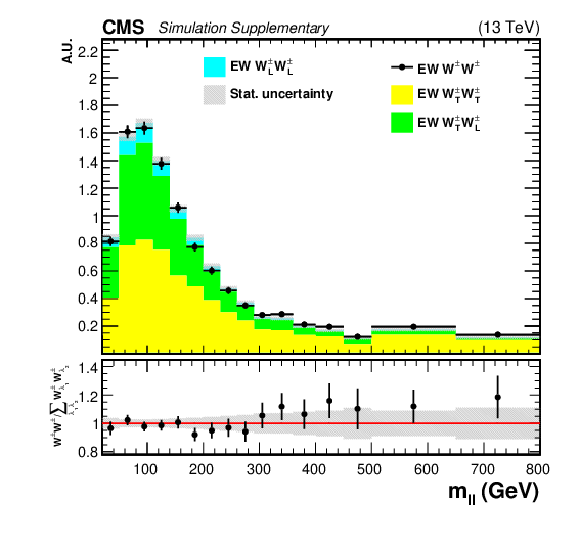
png pdf |
Additional Figure 2-e:
Generator level distributions of $ {m_{\ell \ell}} $ in the fiducial region for the $ {{\mathrm {W}}^\pm _{\mathrm {L}} {\mathrm {W}}^\pm _{\mathrm {L}}} $, $ {{\mathrm {W}}^\pm _{\mathrm {L}} {\mathrm {W}}^\pm _{\mathrm {T}}} $, and $ {{\mathrm {W}}^\pm _{\mathrm {T}} {\mathrm {W}}^\pm _{\mathrm {T}}} $ processes with the helicity eigenstates defined in the parton-parton center-of-mass reference frame. The distributions are also shown for the unpolarized EW $ {{\mathrm {W}}^\pm {\mathrm {W}}^\pm} $ process. The bottom panel shows the ratio of the contribution of the unpolarized $ {{\mathrm {W}}^\pm {\mathrm {W}}^\pm} $ process to that of the sum of the $ {{\mathrm {W}}^\pm _{\mathrm {L}} {\mathrm {W}}^\pm _{\mathrm {L}}} $, $ {{\mathrm {W}}^\pm _{\mathrm {L}} {\mathrm {W}}^\pm _{\mathrm {T}}} $, and $ {{\mathrm {W}}^\pm _{\mathrm {T}} {\mathrm {W}}^\pm _{\mathrm {T}}} $ processes. The gray bands represent the statistical uncertainties associated with the limited number of simulated events. |
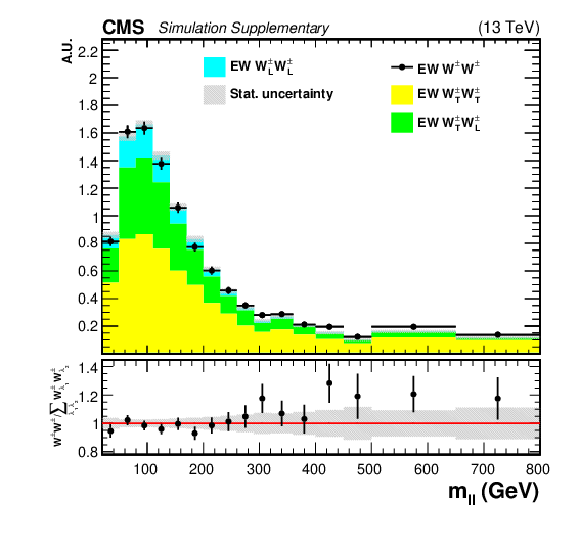
png pdf |
Additional Figure 2-f:
Generator level distributions of $ {m_{\ell \ell}} $ in the fiducial region for the $ {{\mathrm {W}}^\pm _{\mathrm {L}} {\mathrm {W}}^\pm _{\mathrm {L}}} $, $ {{\mathrm {W}}^\pm _{\mathrm {L}} {\mathrm {W}}^\pm _{\mathrm {T}}} $, and $ {{\mathrm {W}}^\pm _{\mathrm {T}} {\mathrm {W}}^\pm _{\mathrm {T}}} $ processes with the helicity eigenstates defined in the $ {{\mathrm {W}}^\pm {\mathrm {W}}^\pm} $ center-of-mass reference frame. The distributions are also shown for the unpolarized EW $ {{\mathrm {W}}^\pm {\mathrm {W}}^\pm} $ process. The bottom panel shows the ratio of the contribution of the unpolarized $ {{\mathrm {W}}^\pm {\mathrm {W}}^\pm} $ process to that of the sum of the $ {{\mathrm {W}}^\pm _{\mathrm {L}} {\mathrm {W}}^\pm _{\mathrm {L}}} $, $ {{\mathrm {W}}^\pm _{\mathrm {L}} {\mathrm {W}}^\pm _{\mathrm {T}}} $, and $ {{\mathrm {W}}^\pm _{\mathrm {T}} {\mathrm {W}}^\pm _{\mathrm {T}}} $ processes. The gray bands represent the statistical uncertainties associated with the limited number of simulated events. |
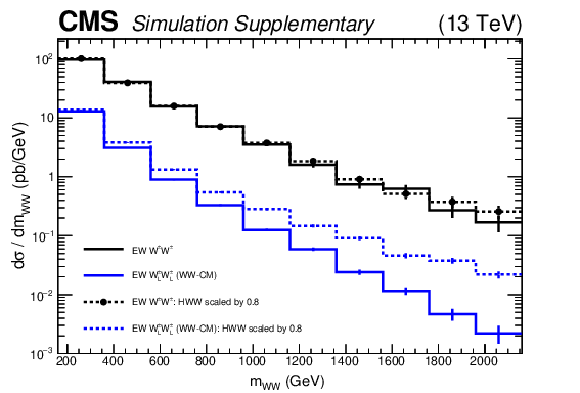
png pdf |
Additional Figure 3:
Generator level distribution of diboson mass for the SM $ {{\mathrm {W}}^\pm {\mathrm {W}}^\pm} $ (black) and $ {{\mathrm {W}}^\pm _{\mathrm {L}} {\mathrm {W}}^\pm _{\mathrm {L}}} $ (blue) processes with the helicity eigenstates defined in the $ {{\mathrm {W}}^\pm {\mathrm {W}}^\pm} $ center-of-mass reference frame. The distributions are shown requiring jets with $ {p_{\mathrm {T}}} > $ 30 GeV and $ {| \eta |} < $ 5.0, with a dijet mass $ {m_{{\mathrm {j}} {\mathrm {j}}}} > $ 400 GeV and a pseudorapidity separation $ {{| \Delta \eta _{{\mathrm {j}} {\mathrm {j}}} |}} > $ 2.4. The dashed lines show the distributions of the $ {{\mathrm {W}}^\pm {\mathrm {W}}^\pm} $ and $ {{\mathrm {W}}^\pm _{\mathrm {L}} {\mathrm {W}}^\pm _{\mathrm {L}}} $ processes with the value of the Higgs boson coupling to W bosons scaled by a factor of 0.8. |
| Additional Tables | |
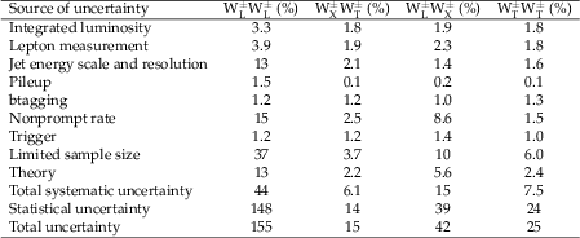
png pdf |
Additional Table 1:
Relative systematic uncertainties in the $ {{\mathrm {W}}^\pm _{\mathrm {L}} {\mathrm {W}}^\pm _{\mathrm {L}}} $ and $ {{\mathrm {W}}^\pm _{\mathrm {X}} {\mathrm {W}}^\pm _{\mathrm {T}}} $, and in the $ {{\mathrm {W}}^\pm _{\mathrm {L}} {\mathrm {W}}^\pm _{\mathrm {X}}} $ and $ {{\mathrm {W}}^\pm _{\mathrm {T}} {\mathrm {W}}^\pm _{\mathrm {T}}} $ cross section measurements in units of percent, using the helicity eigenstates in the initial state parton-parton center-of-mass reference frame. |
| References | ||||
| 1 | B. W. Lee, C. Quigg, and H. B. Thacker | The strength of weak interactions at very high-energies and the Higgs boson mass | PRL 38 (1977) 883 | |
| 2 | B. W. Lee, C. Quigg, and H. B. Thacker | Weak interactions at very high-energies: the role of the Higgs boson mass | PRD 16 (1977) 1519 | |
| 3 | ATLAS Collaboration | Observation of a new particle in the search for the standard model Higgs boson with the ATLAS detector at the LHC | PLB 716 (2012) 1 | 1207.7214 |
| 4 | CMS Collaboration | Observation of a new boson at a mass of 125 GeV with the CMS experiment at the LHC | PLB 716 (2012) 30 | CMS-HIG-12-028 1207.7235 |
| 5 | CMS Collaboration | Observation of a new boson with mass near 125 GeV in pp collisions at $ \sqrt{s} = $ 7 and 8 TeV | JHEP 06 (2013) 081 | CMS-HIG-12-036 1303.4571 |
| 6 | D. Espriu and B. Yencho | Longitudinal WW scattering in light of the Higgs boson discovery | PRD 87 (2013) 055017 | 1212.4158 |
| 7 | J. Chang, K. Cheung, C.-T. Lu, and T.-C. Yuan | WW scattering in the era of post-Higgs-boson discovery | PRD 87 (2013) 093005 | 1303.6335 |
| 8 | ATLAS, CMS Collaboration | Measurements of the Higgs boson production and decay rates and constraints on its couplings from a combined ATLAS and CMS analysis of the LHC pp collision data at $ \sqrt{s}= $ 7 and 8 TeV | JHEP 08 (2016) 045 | 1606.02266 |
| 9 | CMS Collaboration | Measurements of properties of the Higgs boson decaying to a W boson pair in pp collisions at $ \sqrt{s}= $ 13 TeV | PLB 791 (2019) 96 | CMS-HIG-16-042 1806.05246 |
| 10 | S. Brass et al. | Transversal modes and Higgs bosons in electroweak vector-boson scattering at the LHC | EPJC 78 (2018) 931 | 1807.02512 |
| 11 | ATLAS Collaboration | Evidence for electroweak production of $ W^{\pm}W^{\pm} $jj in pp collisions at $ \sqrt{s}= $ 8 TeV with the ATLAS detector | PRL 113 (2014) 141803 | 1405.6241 |
| 12 | CMS Collaboration | Study of vector boson scattering and search for new physics in events with two same-sign leptons and two jets | PRL 114 (2015) 051801 | CMS-SMP-13-015 1410.6315 |
| 13 | CMS Collaboration | Observation of electroweak production of same-sign W boson pairs in the two jet and two same-sign lepton final state in proton-proton collisions at $ \sqrt{s} = $ 13 TeV | PRL 120 (2018) 081801 | CMS-SMP-17-004 1709.05822 |
| 14 | ATLAS Collaboration | Observation of electroweak production of a same-sign $ W $ boson pair in association with two jets in pp collisions at $ \sqrt{s}= $ 13 TeV with the ATLAS detector | PRL 123 (2019) 161801 | 1906.03203 |
| 15 | CMS Collaboration | Measurements of production cross sections of WZ and same-sign WW boson pairs in association with two jets in proton-proton collisions at $ \sqrt{s} = $ 13 TeV | PLB 809 (2020) 135710 | CMS-SMP-19-012 2005.01173 |
| 16 | CMS Collaboration | CMS luminosity measurement for the 2016 data-taking period | CMS-PAS-LUM-15-001 | CMS-PAS-LUM-15-001 |
| 17 | CMS Collaboration | CMS luminosity measurement for the 2017 data-taking period at $ \sqrt{s} = $ 13 TeV | CMS-PAS-LUM-17-004 | CMS-PAS-LUM-17-004 |
| 18 | CMS Collaboration | CMS luminosity measurement for the 2018 data-taking period at $ \sqrt{s} = $ 13 TeV | CMS-PAS-LUM-18-002 | CMS-PAS-LUM-18-002 |
| 19 | CMS Collaboration | The CMS experiment at the CERN LHC | JINST 3 (2008) S08004 | CMS-00-001 |
| 20 | CMS Collaboration | The CMS trigger system | JINST 12 (2017) P01020 | CMS-TRG-12-001 1609.02366 |
| 21 | \GEANTfour Collaboration | GEANT4 --- a simulation toolkit | NIMA 506 (2003) 250 | |
| 22 | R. Frederix and S. Frixione | Merging meets matching in MC@NLO | JHEP 12 (2012) 061 | 1209.6215 |
| 23 | J. Alwall et al. | The automated computation of tree-level and next-to-leading order differential cross sections, and their matching to parton shower simulations | JHEP 07 (2014) 079 | 1405.0301 |
| 24 | D. Buarque Franzosi, O. Mattelaer, R. Ruiz, and S. Shil | Automated predictions from polarized matrix elements | JHEP 04 (2020) 082 | 1912.01725 |
| 25 | NNPDF Collaboration | Parton distributions from high-precision collider data | EPJC 77 (2017) 663 | 1706.00428 |
| 26 | A. Ballestrero et al. | PHANTOM: a Monte Carlo event generator for six parton final states at high energy colliders | CPC 180 (2009) 401 | 0801.3359 |
| 27 | A. Ballestrero, D. Buarque Franzosi, L. Oggero, and E. Maina | Vector boson scattering at the LHC: counting experiments for unitarized models in a full six fermion approach | JHEP 03 (2012) 031 | 1112.1171 |
| 28 | A. Ballestrero, E. Maina, and G. Pelliccioli | $ \mathrm{W} $ boson polarization in vector boson scattering at the LHC | JHEP 03 (2018) 170 | 1710.09339 |
| 29 | B. Biedermann, A. Denner, and M. Pellen | Large electroweak corrections to vector boson scattering at the Large Hadron Collider | PRL 118 (2017) 261801 | 1611.02951 |
| 30 | B. Biedermann, A. Denner, and M. Pellen | Complete NLO corrections to W$ ^{+} $W$ ^{+} $ scattering and its irreducible background at the LHC | JHEP 10 (2017) 124 | 1708.00268 |
| 31 | A. Denner and S. Pozzorini | One loop leading logarithms in electroweak radiative corrections. 1. Results | EPJC 18 (2001) 461 | hep-ph/0010201 |
| 32 | J. Alwall et al. | Comparative study of various algorithms for the merging of parton showers and matrix elements in hadronic collisions | EPJC 53 (2008) 473 | 0706.2569 |
| 33 | S. Frixione and B. R. Webber | Matching NLO QCD computations and parton shower simulations | JHEP 06 (2002) 029 | hep-ph/0204244 |
| 34 | P. Nason | A new method for combining NLO QCD with shower Monte Carlo algorithms | JHEP 11 (2004) 040 | hep-ph/0409146 |
| 35 | S. Frixione, P. Nason, and C. Oleari | Matching NLO QCD computations with parton shower simulations: the POWHEG method | JHEP 11 (2007) 070 | 0709.2092 |
| 36 | S. Alioli, P. Nason, C. Oleari, and E. Re | NLO vector-boson production matched with shower in POWHEG | JHEP 07 (2008) 060 | 0805.4802 |
| 37 | S. Alioli, P. Nason, C. Oleari, and E. Re | A general framework for implementing NLO calculations in shower Monte Carlo programs: the POWHEG BOX | JHEP 06 (2010) 043 | 1002.2581 |
| 38 | CMS Collaboration | Measurement of the associated production of a single top quark and a Z boson in pp collisions at $ \sqrt{s} = $ 13 TeV | PLB 779 (2018) 358 | CMS-TOP-16-020 1712.02825 |
| 39 | T. Sjostrand et al. | An introduction to PYTHIA 8.2 | CPC 191 (2015) 159 | 1410.3012 |
| 40 | NNPDF Collaboration | Parton distributions for the LHC Run II | JHEP 04 (2015) 040 | 1410.8849 |
| 41 | P. Skands, S. Carrazza, and J. Rojo | Tuning PYTHIA 8.1: the Monash 2013 tune | EPJC 74 (2014) 3024 | 1404.5630 |
| 42 | CMS Collaboration | Event generator tunes obtained from underlying event and multiparton scattering measurements | EPJC 76 (2016) 155 | CMS-GEN-14-001 1512.00815 |
| 43 | CMS Collaboration | Extraction and validation of a new set of CMS PYTHIA8 tunes from underlying-event measurements | EPJC 80 (2020) 4 | CMS-GEN-17-001 1903.12179 |
| 44 | CMS Collaboration | Particle-flow reconstruction and global event description with the CMS detector | JINST 12 (2017) P10003 | CMS-PRF-14-001 1706.04965 |
| 45 | M. Cacciari, G. P. Salam, and G. Soyez | The anti-$ {k_{\mathrm{T}}} $ jet clustering algorithm | JHEP 04 (2008) 063 | 0802.1189 |
| 46 | M. Cacciari, G. P. Salam, and G. Soyez | FastJet user manual | EPJC 72 (2012) 1896 | 1111.6097 |
| 47 | CMS Collaboration | Jet energy scale and resolution in the CMS experiment in pp collisions at 8 TeV | JINST 12 (2017) P02014 | CMS-JME-13-004 1607.03663 |
| 48 | CMS Collaboration | Pileup mitigation at CMS in 13 TeV data | JINST 15 (2020) P09018 | CMS-JME-18-001 2003.00503 |
| 49 | CMS Collaboration | Performance of missing transverse momentum reconstruction in proton-proton collisions at $ \sqrt{s} = $ 13 TeV using the CMS detector | JINST 14 (2019) P07004 | CMS-JME-17-001 1903.06078 |
| 50 | CMS Collaboration | Performance of electron reconstruction and selection with the CMS detector in proton-proton collisions at $ \sqrt{s} = $ 8 TeV | JINST 10 (2015) P06005 | CMS-EGM-13-001 1502.02701 |
| 51 | CMS Collaboration | Electron and photon performance in cms with the full 2017 data sample and additional 2016 highlights for the calor 2018 conference | CDS | |
| 52 | CMS Collaboration | Performance of the CMS muon detector and muon reconstruction with proton-proton collisions at $ \sqrt{s} = $ 13 TeV | JINST 13 (2018) P06015 | CMS-MUO-16-001 1804.04528 |
| 53 | CMS Collaboration | Performance of CMS muon reconstruction in cosmic-ray events | JINST 5 (2010) T03022 | CMS-CFT-09-014 0911.4994 |
| 54 | CMS Collaboration | Performance of the reconstruction and identification of high-momentum muons in proton-proton collisions at $ \sqrt{s} = $ 13 TeV | JINST 15 (2020) P02027 | CMS-MUO-17-001 1912.03516 |
| 55 | Particle Data Group, P. A. Zyla et al. | Review of particle physics | Progress of Theoretical and Experimental Physics 2020 (2020) 083C01 | |
| 56 | D. L. Rainwater, R. Szalapski, and D. Zeppenfeld | Probing color singlet exchange in $ \mathrm{Z} $ + 2-jet events at the CERN LHC | PRD 54 (1996) 6680 | hep-ph/9605444 |
| 57 | CMS Collaboration | Identification of heavy-flavour jets with the CMS detector in pp collisions at 13 TeV | JINST 13 (2018) P05011 | CMS-BTV-16-002 1712.07158 |
| 58 | K. Doroba et al. | The $ \mathrm{W}_\mathrm{L}\mathrm{W}_\mathrm{L} $ scattering at the LHC: improving the selection criteria | PRD 86 (2012) 036011 | 1201.2768 |
| 59 | H. Voss, A. Hocker, J. Stelzer, and F. Tegenfeldt | TMVA, the toolkit for multivariate data analysis with ROOT | in XIth International Workshop on Advanced Computing and Analysis Techniques in Physics Research (ACAT), p. 40 2007 [PoS(ACAT)040] | physics/0703039 |
| 60 | F. Chollet et al. | Keras | link | |
| 61 | M. Abadi et al. | Tensorflow: large-scale machine learning on heterogeneous distributed systems | 2016 Software available from tensorflow.org. \url http://tensorflow.org/ | |
| 62 | ATLAS Collaboration | Measurement of the inelastic proton-proton cross section at $ \sqrt{s} = $ 13 TeV with the ATLAS detector at the LHC | PRL 117 (2016) 182002 | 1606.02625 |
| 63 | CMS Collaboration | Measurement of the inelastic proton-proton cross section at $ \sqrt{s}= $ 13 TeV | JHEP 07 (2018) 161 | CMS-FSQ-15-005 1802.02613 |
| 64 | J. Butterworth et al. | PDF4LHC recommendations for LHC Run II | JPG 43 (2016) 023001 | 1510.03865 |
| 65 | T. Junk | Confidence level computation for combining searches with small statistics | NIMA 434 (1999) 435 | hep-ex/9902006 |
| 66 | A. L. Read | Presentation of search results: the $ CL_s $ technique | JPG 28 (2002) 2693 | |
| 67 | G. Cowan, K. Cranmer, E. Gross, and O. Vitells | Asymptotic formulae for likelihood-based tests of new physics | EPJC 71 (2011) 1554 | 1007.1727 |
| 68 | A. Ballestrero, E. Maina, and G. Pelliccioli | Different polarization definitions in same-sign $ WW $ scattering at the LHC | Submitted to PLB | 2007.07133 |

|
Compact Muon Solenoid LHC, CERN |
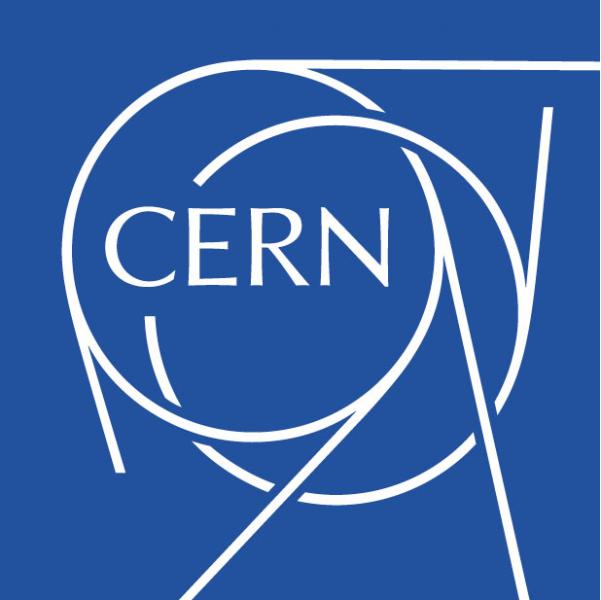
|
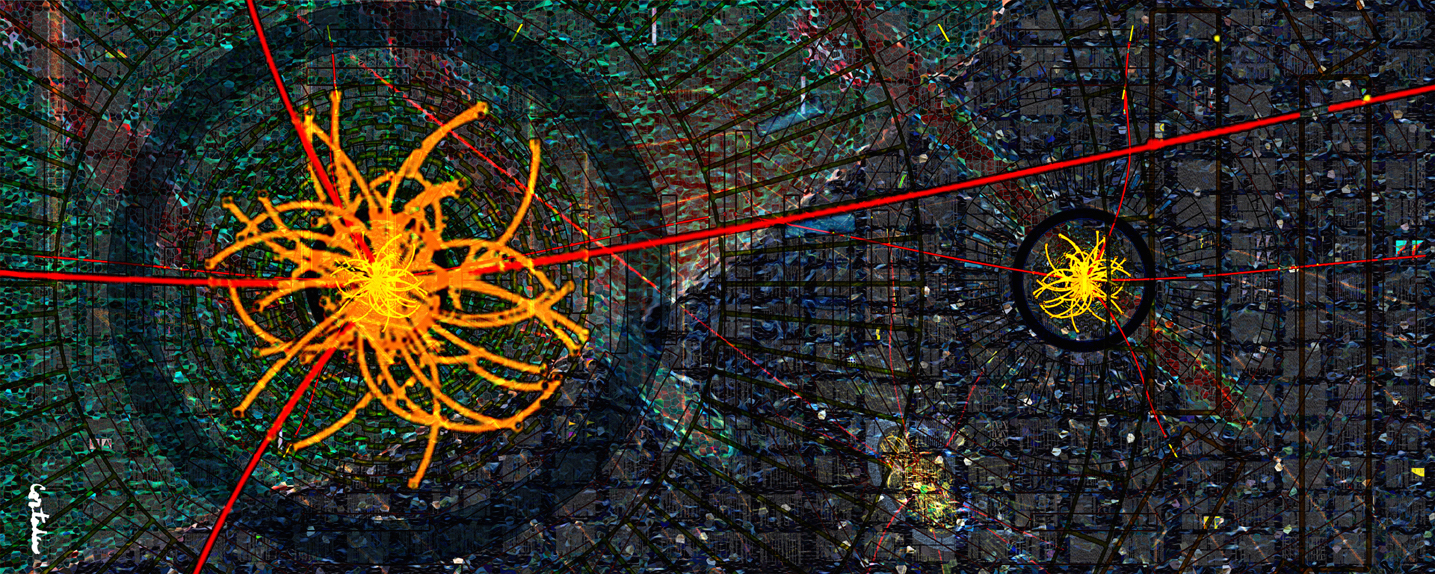
|
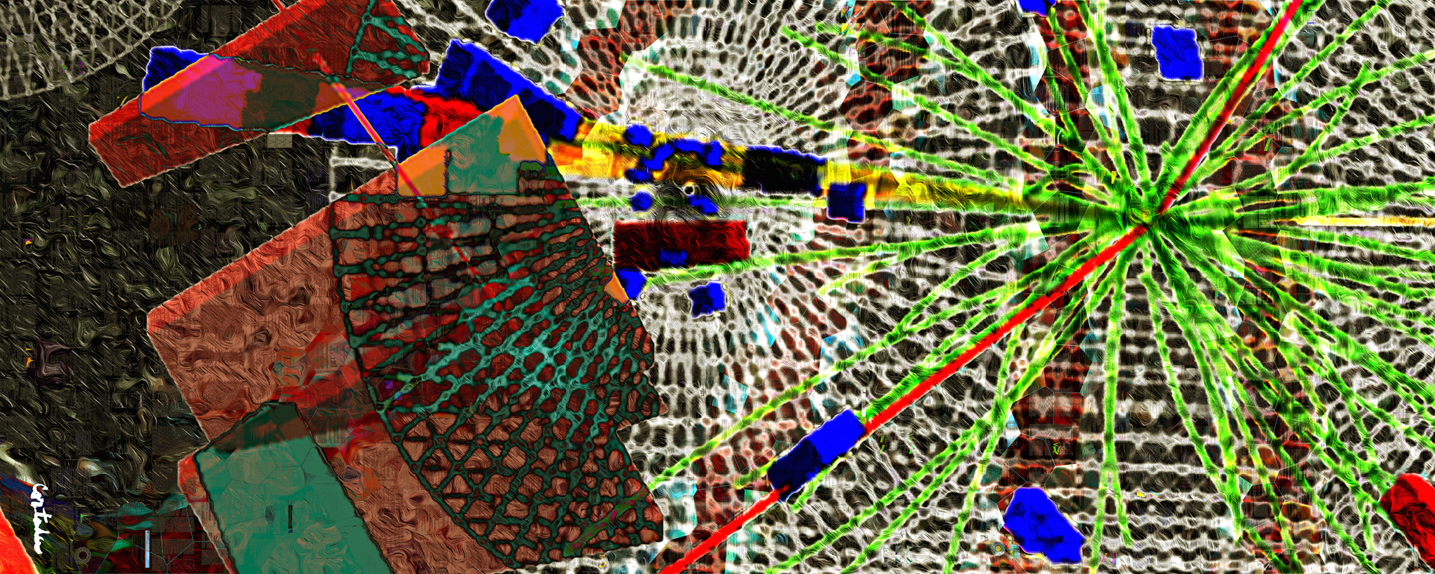
|
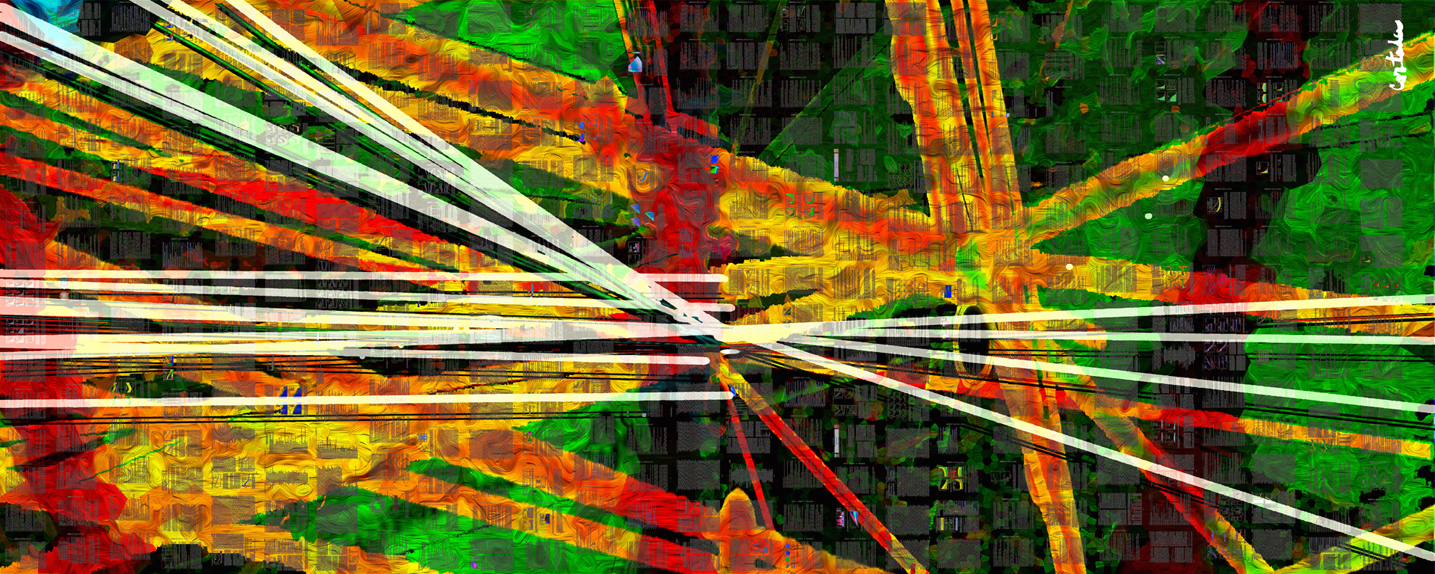
|
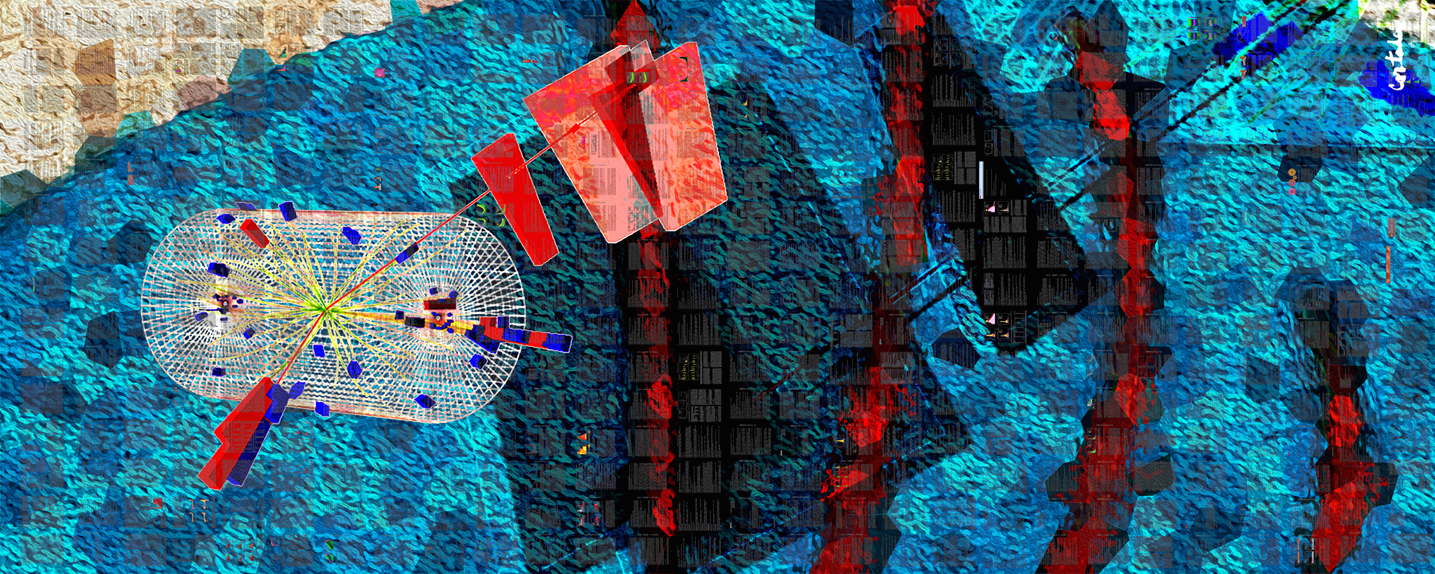
|
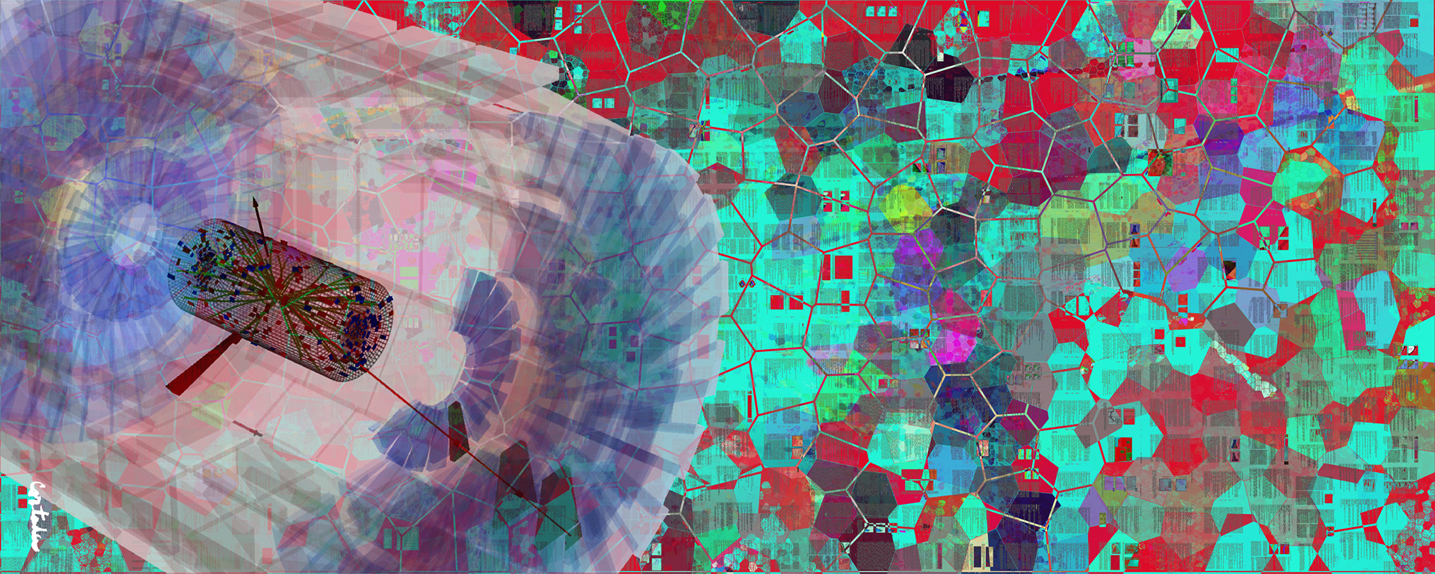
|